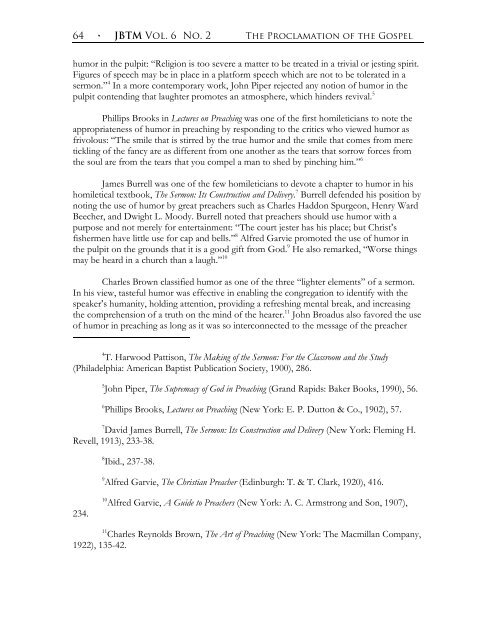0 jbtm vol. 6, no. 2 the proclamation of the gospel - Baptist Center for ...
0 jbtm vol. 6, no. 2 the proclamation of the gospel - Baptist Center for ...
0 jbtm vol. 6, no. 2 the proclamation of the gospel - Baptist Center for ...
Create successful ePaper yourself
Turn your PDF publications into a flip-book with our unique Google optimized e-Paper software.
64 ٠ JBTM Vol. 6 No. 2 The Proclamation <strong>of</strong> <strong>the</strong> Gospel<br />
humor in <strong>the</strong> pulpit: “Religion is too severe a matter to be treated in a trivial or jesting spirit.<br />
Figures <strong>of</strong> speech may be in place in a plat<strong>for</strong>m speech which are <strong>no</strong>t to be tolerated in a<br />
sermon.” 4 In a more contemporary work, John Piper rejected any <strong>no</strong>tion <strong>of</strong> humor in <strong>the</strong><br />
pulpit contending that laughter promotes an atmosphere, which hinders revival. 5<br />
Phillips Brooks in Lectures on Preaching was one <strong>of</strong> <strong>the</strong> first homileticians to <strong>no</strong>te <strong>the</strong><br />
appropriateness <strong>of</strong> humor in preaching by responding to <strong>the</strong> critics who viewed humor as<br />
fri<strong>vol</strong>ous: “The smile that is stirred by <strong>the</strong> true humor and <strong>the</strong> smile that comes from mere<br />
tickling <strong>of</strong> <strong>the</strong> fancy are as different from one a<strong>no</strong><strong>the</strong>r as <strong>the</strong> tears that sorrow <strong>for</strong>ces from<br />
<strong>the</strong> soul are from <strong>the</strong> tears that you compel a man to shed by pinching him.” 6<br />
James Burrell was one <strong>of</strong> <strong>the</strong> few homileticians to devote a chapter to humor in his<br />
homiletical textbook, The Sermon: Its Construction and Delivery. 7 Burrell defended his position by<br />
<strong>no</strong>ting <strong>the</strong> use <strong>of</strong> humor by great preachers such as Charles Haddon Spurgeon, Henry Ward<br />
Beecher, and Dwight L. Moody. Burrell <strong>no</strong>ted that preachers should use humor with a<br />
purpose and <strong>no</strong>t merely <strong>for</strong> entertainment: “The court jester has his place; but Christ=s<br />
fishermen have little use <strong>for</strong> cap and bells.” 8 Alfred Garvie promoted <strong>the</strong> use <strong>of</strong> humor in<br />
<strong>the</strong> pulpit on <strong>the</strong> grounds that it is a good gift from God. 9 He also remarked, “Worse things<br />
may be heard in a church than a laugh.” 10<br />
Charles Brown classified humor as one <strong>of</strong> <strong>the</strong> three “lighter elements” <strong>of</strong> a sermon.<br />
In his view, tasteful humor was effective in enabling <strong>the</strong> congregation to identify with <strong>the</strong><br />
speaker=s humanity, holding attention, providing a refreshing mental break, and increasing<br />
<strong>the</strong> comprehension <strong>of</strong> a truth on <strong>the</strong> mind <strong>of</strong> <strong>the</strong> hearer. 11 John Broadus also favored <strong>the</strong> use<br />
<strong>of</strong> humor in preaching as long as it was so interconnected to <strong>the</strong> message <strong>of</strong> <strong>the</strong> preacher<br />
4 T. Harwood Pattison, The Making <strong>of</strong> <strong>the</strong> Sermon: For <strong>the</strong> Classroom and <strong>the</strong> Study<br />
(Philadelphia: American <strong>Baptist</strong> Publication Society, 1900), 286.<br />
5 John Piper, The Supremacy <strong>of</strong> God in Preaching (Grand Rapids: Baker Books, 1990), 56.<br />
6 Phillips Brooks, Lectures on Preaching (New York: E. P. Dutton & Co., 1902), 57.<br />
7 David James Burrell, The Sermon: Its Construction and Delivery (New York: Fleming H.<br />
Revell, 1913), 233-38.<br />
234.<br />
1922), 135-42.<br />
8 Ibid., 237-38.<br />
9 Alfred Garvie, The Christian Preacher (Edinburgh: T. & T. Clark, 1920), 416.<br />
10 Alfred Garvie, A Guide to Preachers (New York: A. C. Armstrong and Son, 1907),<br />
11 Charles Rey<strong>no</strong>lds Brown, The Art <strong>of</strong> Preaching (New York: The Macmillan Company,


